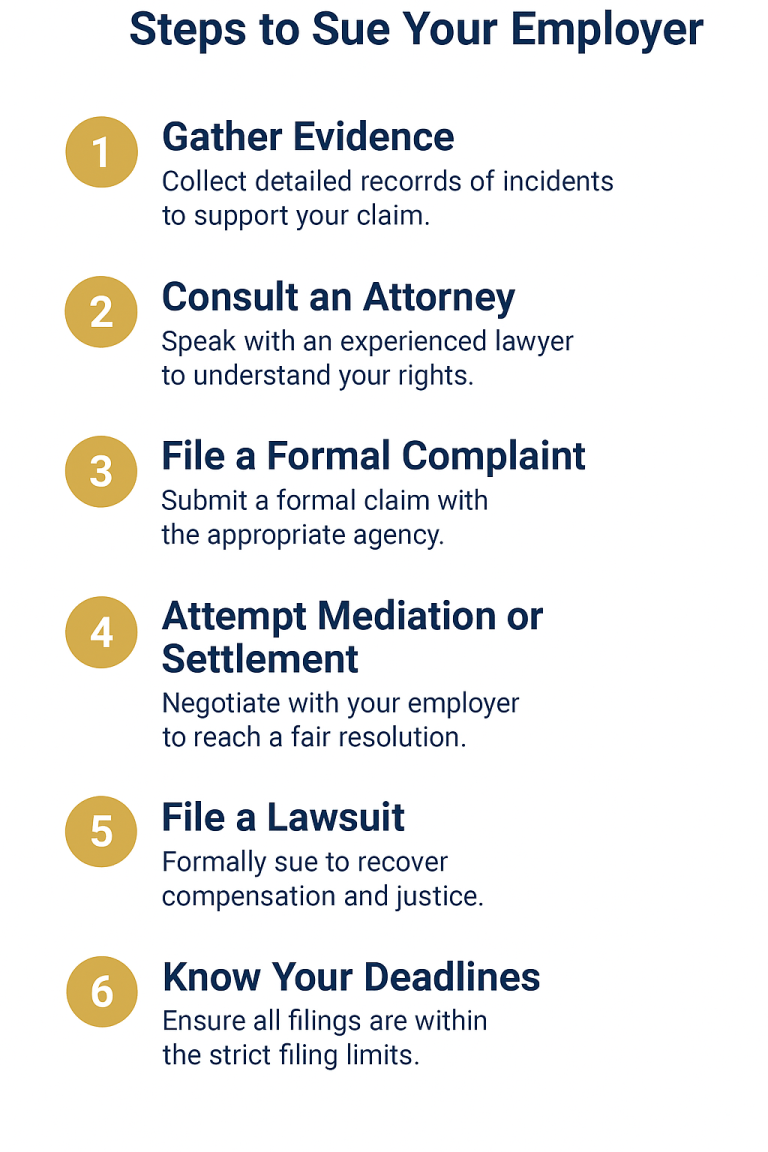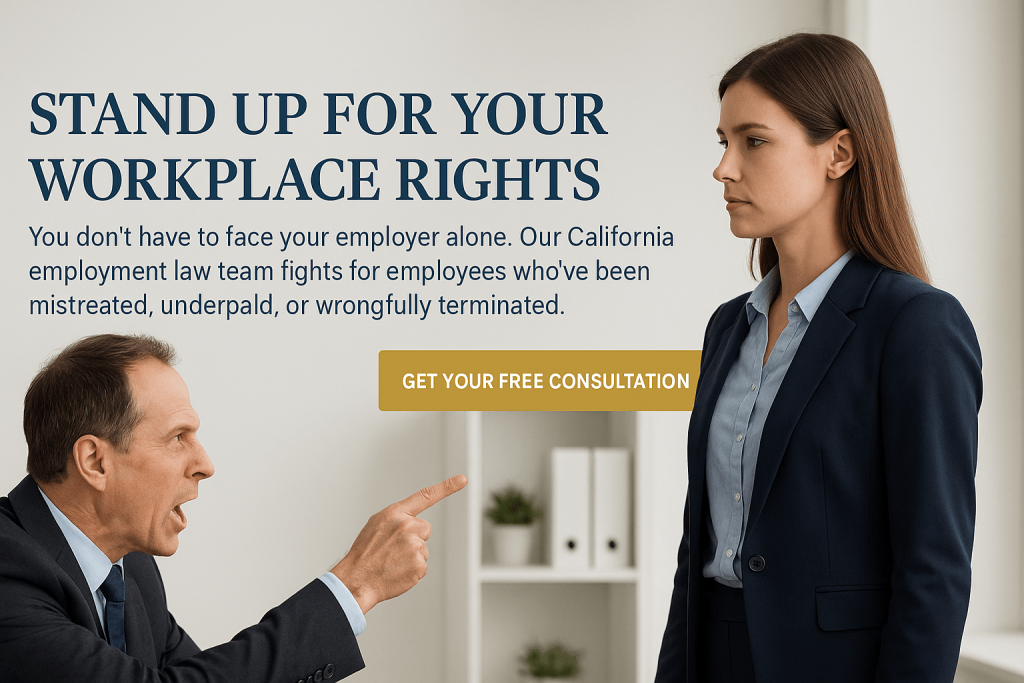Reasons to Sue Employer in California: 16 Common Grounds to Sue

You can take legal action against your employer in California for issues such as discrimination, harassment, wrongful termination, and retaliation. Employees may also have claims for wage and hour violations, including unpaid overtime or missed breaks, as well as breaches of employment contracts or workplace safety laws. These protections ensure that workers are treated fairly and employers are held accountable under California labor laws.
If you believe your rights have been violated, our experienced California employment law attorney can help you understand your options and pursue justice. Call (866) 646-6676 today for a free consultation and take the first step toward protecting your career and future.
16 Grounds for a lawsuit against your employer
If you’ve faced unfair treatment at work, you might have grounds to sue your employer under California law. Common issues include wrongful termination, discrimination, unpaid wages, and unsafe conditions. Knowing these issues can help you identify if your rights were violated and decide how to take action.
1. Being denied breaks
California labor laws guarantee meal and rest breaks during shifts. If your employer routinely denies you these breaks, it could lead to wage and hour violations.
Example: A warehouse worker in Sacramento is required to skip lunch breaks regularly due to workload demands without compensation for missed breaks.
2. Breach of implied contract by your employer
Even without a formal written agreement, implied promises by your employer can be legally binding. If these promises are broken, you may have a valid claim.
Example: An employee relocates to San Francisco based on verbal assurances of long-term employment, and then gets terminated abruptly without justification shortly after relocating.
3. Defamation (libel/slander)
Defamation occurs when an employer knowingly makes false statements—verbally (slander) or in writing (libel)—that harm your professional reputation. If false accusations from your employer damage your career opportunities or cause financial loss, you may have grounds for a defamation lawsuit.
Example: A supervisor falsely claims an employee stole company funds, resulting in termination and causing the employee to lose a pending job offer at another company.
4. Demotion
If you’ve been unjustly demoted due to discrimination, retaliation, or whistleblowing, you might be eligible to sue your employer.
Example: A sales manager in Los Angeles is demoted to an entry-level role after reporting gender discrimination in promotion practices to HR.
5. Discrimination
The California Fair Employment and Housing Act (FEHA) prohibits workplace discrimination based on protected characteristics, including race, gender, age, disability, religion, and sexual orientation. If your employer has discriminated against you due to any of these factors, you may have grounds to sue.
Example: A qualified employee in San Diego is consistently overlooked for promotions because of their age, while younger, less experienced coworkers receive opportunities.
Additional reading: wrongful termination in California

6. Fraud or misrepresentation
Employer fraud involves intentionally deceiving an employee, typically regarding job duties, compensation, bonuses, or workplace conditions. Misrepresentation can result in financial loss, missed opportunities, and emotional distress, creating grounds for a lawsuit.
Example: An employer knowingly promises a specific salary, benefits, or job title during recruitment but later fails to deliver on these promises, causing financial harm or career setbacks.
7. Harassment
Harassment based on protected characteristics—such as sexual, racial, or disability-based harassment—is illegal in California workplaces. Employers who ignore harassment complaints can be held accountable.
Example: An employee in Riverside experiences repeated sexual advances and offensive comments from their supervisor, and HR fails to address or investigate these complaints effectively.
8. Lost benefits
If unfair termination or demotion caused you to lose significant benefits like health insurance, retirement plans, or stock options, you could seek compensation.
Example: An Irvine employee loses access to healthcare and retirement benefits after being wrongfully terminated for reporting safety violations.
9. Lost income
You can sue your employer for lost income if wrongful termination, demotion, or wage violations cause financial harm. This includes lost wages, bonuses, or raises you would otherwise have earned.
Example: A manager in Santa Monica is wrongfully terminated in retaliation for filing a harassment complaint, causing substantial lost income and benefits over six months of unemployment.
10. Minimum wage violations
Employers in California must pay at least the state minimum wage. Paying employees below minimum wage violates state labor laws and can result in legal action.
Example: Restaurant employees in Fresno are paid less than minimum wage, with management incorrectly claiming tips cover the wage shortfall.
11. Misclassifying your employee status
Misclassifying employees as independent contractors is illegal and can deprive workers of overtime pay, benefits, and employment protections.
Example: Drivers for a delivery company in Oakland are misclassified as independent contractors, depriving them of overtime pay, health insurance, workers’ compensation benefits, and legal protections provided to employees.
12. Overtime pay violations
California law mandates overtime pay for hours exceeding 8 per day or 40 per week. Employers violating overtime regulations are subject to wage and hour lawsuits.
Example: A retail worker in Bakersfield regularly works 50-hour weeks without receiving overtime compensation as required by state law.
You can file a claim with the California Labor Commissioner’s Office for unpaid overtime and wage disputes.
13. Retaliation for reporting violations
California Labor Code §1102.5 protects whistleblowers from employer retaliation. Actions like demotion, negative reviews, pay cuts, or situations where an employer fires an employee for reporting violations can lead to lawsuits.
Example: An office worker in Anaheim reports wage theft and is subsequently assigned impossible deadlines, given negative performance evaluations, and eventually fired.
California’s Labor Code §1102.5 offers robust protections against retaliation, ensuring your right to report wrongdoing without fear.
14. Unsafe working conditions & OSHA violations
California employers must maintain safe workplaces under Cal/OSHA regulations. If you’re harmed by unsafe working conditions, you can file a complaint or lawsuit for compensation.
Example: A construction worker in San Jose suffers a severe back injury after repeatedly ignoring safety concerns about improper equipment use, resulting in significant medical expenses and months of lost wages
Cal/OSHA reports thousands of workplace safety violations annually. Reporting unsafe conditions protects you and your coworkers from future harm.
15. Violations of the California Family Rights Act (CFRA)
Under the California Family Rights Act (CFRA), employers must provide eligible employees up to 12 weeks of unpaid, job-protected leave for qualifying medical and family reasons. Employers who deny leave requests, retaliate against employees who use leave, or fail to reinstate employees after leave, may face lawsuits.
Example: An employee takes CFRA leave for a serious medical condition and is demoted or fired upon returning to work.

16. Wage and hour violations
Wage and hour claims are common legal grounds against employers. Violations include unpaid wages, overtime denial, missed breaks, and illegal deductions.
Example: Workers at a Sacramento manufacturing facility regularly work unpaid overtime, resulting in significant loss of earned wages.
Workers' compensation claim retaliation
It’s illegal for employers to retaliate against employees who file workers’ compensation claims after workplace injuries. Such retaliation includes firing, demotion, or harassment.’
Example: An employee in Long Beach is fired shortly after filing a workers’ compensation claim for an injury sustained on the job, despite consistent prior positive performance reviews.
Additional reading: how to report an employer for unfair treatment
Don’t let any workplace injustice go unchallenged—reach out to our experienced Huntington Beach employment lawyer for immediate support.
Is Filing a Lawsuit Against Your Employer Worth It?
Deciding whether to sue your employer involves carefully weighing potential benefits and risks. Getting to know both sides can help you make an informed choice about pursuing legal action.
Pros of suing your employer
- Financial compensation: You can recover lost wages, emotional distress damages, punitive damages, and legal fees.
- Holding employers accountable: Suing can deter future misconduct and lead to improved workplace conditions.
- Validation and justice: A successful lawsuit can offer emotional closure and a sense of justice.
✔️ With our strong legal advocate, your chances of achieving meaningful compensation and driving positive change increase significantly.
Cons of suing your employer
- Time and emotional strain: Lawsuits can be stressful, lengthy, and emotionally taxing.
- Uncertain outcomes: There’s no guarantee of winning, and settlements may be lower than expected.
- Potential career impact: Although California employment laws protect against formal retaliation, informal biases within certain industries could still subtly affect future employment prospects.
Working with our experienced lawyer will mitigate these risks, strengthening your case and demonstrating to future employers that your claim was justified.
Additional reading: Torrance workplace discrimination lawyer
Steps to sue your employer in California
If you’re considering legal action against your employer for discrimination, retaliation, or reporting illegal activity, following the correct steps can significantly strengthen your case. Acting quickly ensures you preserve key proof, meet filing deadlines, and fully exercise your right to sue under California employment law.
Here’s what to do next:

- Gather evidence – Keep detailed records of incidents, including dates, times, emails, HR reports, and witness statements to support your claim.
- Consult an attorney – Speak with an experienced employment lawyer early to understand your rights, evaluate your case, and ensure all filings meet legal requirements.
- File a formal complaint – Depending on your situation, submit a claim with the EEOC, California Civil Rights Department (CRD), Labor Commissioner, or Cal/OSHA.
- Attempt mediation or settlement – Your lawyer may negotiate with your employer to reach a fair resolution before going to court, saving time and stress.
- File a lawsuit – If settlement efforts fail, your attorney can formally sue to recover the compensation and justice you deserve.
- Know your deadlines – California has strict filing limits (statutes of limitations). Missing these can prevent you from pursuing your claim.
Many employers attempt to settle retaliation and discrimination cases before they reach court, so consulting a lawyer early is the best way to protect your right to sue and secure fair compensation.
Additional reading: California discrimination laws
How long do you have to file a lawsuit? (California filing deadlines)
California employment lawsuits have strict deadlines, known as statutes of limitations. The timeframe varies based on the type of claim you’re pursuing, so it’s essential to act quickly. Missing your deadline can mean losing your right to compensation entirely.
Below is a quick reference table of filing deadlines based on common employment claims in California:
| Type of Claim | Deadline to File | Relevant Law or Agency |
|---|---|---|
| Being Denied Breaks | 3 years | California Labor Commissioner |
| California Family Rights Act (CFRA) Violations | 3 years | California CRD (DFEH) |
| Defamation (Libel/Slander) | 1 year | California Code of Civil Procedure §340(c) |
| Demotion (related to retaliation or discrimination) | 3 years | California CRD (DFEH) |
| Fraud or Misrepresentation | 3 years | California Code of Civil Procedure §338(d) |
| Implied Contract Violations by Employer | 2 years (oral), 4 years (written) | California Code of Civil Procedure §337 (written), §339 (oral) |
| Lost Benefits (as wage violations) | 3 years | California Labor Commissioner |
| Lost Income | 3 years | California Labor Commissioner |
| Misclassifying Employee Status | 3 years | California Labor Commissioner |
| Overtime Pay Violations | 3 years | California Labor Commissioner |
| Retaliation (Whistleblower) | 3 years from retaliatory action | California Labor Code §1102.5 |
| Unsafe Working Conditions (OSHA violations) | 6 months (to file OSHA complaint) | Cal/OSHA |
| Wage and Hour Violations (unpaid wages, minimum wage, missed breaks) | 3 years | California Labor Commissioner |
| Workers’ Compensation Claim | 1 year (notify employer within 30 days) | Division of Workers’ Compensation |
| Workplace Discrimination & Harassment | 3 years from the last incident | California CRD (DFEH) |
| Wrongful Termination | 2 years from termination date | California Code of Civil Procedure §335.1 |
⚠️These deadlines are strictly enforced. Acting quickly ensures the strongest possible claim. If you’re unsure about your deadline, our lawyers will provide immediate guidance.
Additional reading: can you sue for sexual harassment at work in California
What compensation can you receive?
If you’re considering suing your employer in California, you may be entitled to various types of compensation depending on your claim. Below are the primary forms of damages you can pursue:
Lost wages & back pay

You can recover compensation for wages lost due to wrongful termination, demotion, denied promotions, or wage violations. This includes your salary, bonuses, commissions, benefits, and overtime you were entitled to but didn’t receive.
Real-world example: In 2023, Home Depot agreed to a $72.5 million settlement in a California wage class action, covering over 272,000 employees who alleged unpaid wages and overtime violations.
Emotional distress damages
These damages compensate you for the psychological impact caused by workplace discrimination, harassment, retaliation, or hostile work environments. You may receive compensation for anxiety, depression, trauma, or stress-related health issues.
Punitive damages for severe employer misconduct
Punitive damages are awarded when your employer’s actions are especially harmful, malicious, or egregious. These damages serve as a punishment and a deterrent against similar misconduct.
Attorney fees & court costs (when applicable)
If you win your lawsuit or reach a settlement, your employer may be required to pay your legal fees and court costs. This allows you to pursue justice without incurring out-of-pocket expenses upfront.
Our attorneys handle employment lawsuits on contingency, meaning you pay nothing unless we successfully recover compensation on your behalf.
Job reinstatement & policy changes
In some cases, you can demand reinstatement to your previous job position or request your employer implement specific policy changes to prevent similar issues from recurring in the future.
Compensation amounts vary significantly depending on the specifics of your case, the quality of evidence, and our attorney’s negotiation skills. Our employment lawyers will help you estimate your potential recovery and advise you on the best strategy for maximizing your compensation.
Protect your future and hold your employer accountable by speaking with our trusted California employment attorney today.
Hypothetical scenario: Filing a lawsuit against an employer
Scenario: Lisa, a retail manager in California, noticed ongoing wage violations at her store, including unpaid overtime and missed meal breaks. After reporting these issues to HR, her employer responded by terminating her employment without justification.
Legal claim: Lisa filed a lawsuit alleging retaliation and wrongful termination, supported by documented communications and coworker statements confirming the violations.
Outcome: With strong evidence, Lisa settled her case and recovered $120,000, covering lost wages and emotional distress.
Lisa’s situation highlights how employees can successfully hold employers accountable for unlawful retaliation and recover significant compensation.
Do you need a lawyer to sue your employer?
Deciding whether to hire an employment lawyer is an important step when considering a lawsuit against your employer. While California law allows you to represent yourself, our experienced legal team will significantly improve your chances of a successful outcome.
Advantages of working with our lawyers
- Higher settlements: We understand California employment law inside and out, allowing us to maximize the compensation you receive.
- Stronger evidence: Our attorneys gather critical evidence, secure witness statements, and negotiate aggressively with your employer’s lawyers.
- Reduced stress: We handle all communications, filings, and deadlines, making the process easier for you.
- No upfront costs: We work on contingency, meaning you pay nothing unless we win your case.
Risks if you represent yourself
- Lower compensation: Without legal support, your employer may take advantage of your lack of legal experience and offer lower settlements.
- Complex legal procedures: Managing EEOC or DFEH complaints and court filings without guidance can be complicated and overwhelming.
- Costly mistakes: Errors in paperwork or missed deadlines can seriously harm your case.
⚖️ Our legal representation significantly reduces these risks and gives your case the strongest chance for a positive outcome.
Reach out to our legal experts for further guidance
California employment laws provide some of the strongest protections nationwide—but they’re also uniquely complex. When dealing with workplace issues, it’s always beneficial to have the support of our experienced employment lawyer from California who fully understands the nuances of local legislation.
Ranked as one of California’s Top Trial Law Firms, we’ve successfully recovered over $100 million for our clients by effectively leveraging these state-specific protections.
If you’ve experienced workplace injustice, contact us online or call us at (866) 646-6676 for a free, confidential consultation—our legal team is ready to help you take the next steps toward justice.
Key takeaways on reasons to sue your employer in California
- Act quickly: Contact us as soon as possible to ensure all incidents are properly documented, protecting your right to compensation.
- File complaints correctly: Our lawyers will help you file complaints with the right California agency, strengthening your case.
- Evaluate settlements carefully: We’ll advise you whether a settlement fairly compensates your losses or if a trial could yield better results.
- Leverage experienced representation: With our attorneys on your side, your chance of success significantly increases.
- Understand your rights: We’ll clearly explain California’s employee protections so you feel confident pursuing justice.
FAQs
Can I sue my employer for unfair treatment?
You can sue if the unfair treatment involves discrimination, harassment, retaliation, or violates specific labor laws. However, general unfairness without a clear legal violation typically isn’t sufficient, so it’s important to identify specific breaches of California employment laws to strengthen your case.
Can I sue my former employer for emotional distress?
Yes, you can sue for emotional distress if it’s connected to workplace harassment, discrimination, retaliation, or wrongful termination. You’ll need to provide clear evidence linking your emotional suffering to your employer’s unlawful actions, typically supported by medical records or professional counseling documentation.
Can I sue my employer for not following company policy?
Not following internal policies alone might not justify a lawsuit unless it breaches an employment contract or violates California employment laws. However, policy violations combined with discrimination, retaliation, or wage issues can strengthen your claim significantly, especially if documented clearly.
Can you bring a civil lawsuit against your employer?
Yes, you can bring a civil lawsuit against your employer if they’ve violated employment laws regarding discrimination, harassment, wrongful termination, wage violations, or retaliation. Typically, you must first file an administrative complaint with the appropriate California agency, such as the CRD (formerly DFEH), before proceeding.
Can I sue my employer for setting me up to fail?
You can sue if being set up to fail constitutes retaliation, discrimination, or creates a hostile work environment. You’ll need evidence showing deliberate unfair treatment—such as unreasonable demands, withholding essential resources, or unfair evaluations—linked clearly to unlawful motivations like retaliation or discrimination.
Related Posts

Pedestrian Injured in Hollywood Car Accident

Colorado QB Dies in Single-Car Accident

Can I Sue a Drunk Driver in California?

Two Killed, Three Injured in Moorpark Head-On Crash







